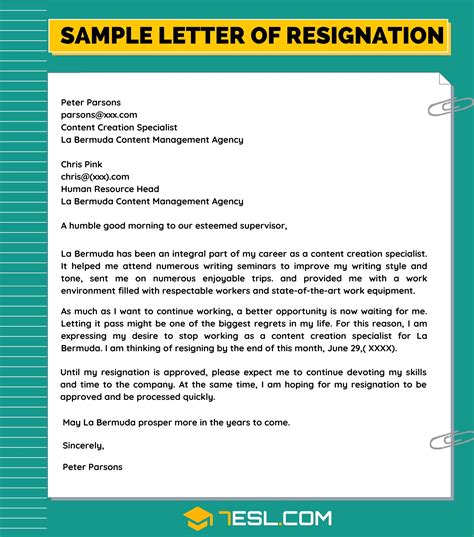Introduction
Resigning from a job can be a nerve-wracking experience, but it’s essential to do it gracefully and professionally. A well-written resignation letter is crucial for maintaining a positive relationship with your employer and ensuring a smooth transition. This comprehensive guide will provide you with everything you need to know to write a resignation letter that leaves a lasting impression.

How to Write a Resignation Letter Sample
[Your Name]
[Your Address]
[City, Postal Code]
[Email Address]
[Phone Number]
[Date]
[Company/Organization Name]
[Company Address]
[City, Postal Code]
Dear [Manager's Name],
Please accept this letter as formal notification that I will be resigning from my position as [Your Position] with [Company Name], effective [Your Last Date of Employment].
I have enjoyed my time at [Company Name] and am grateful for the opportunities I have been given during my tenure. I have learned and grown both professionally and personally, and I will always cherish my experiences here.
My decision to resign was not made lightly. I have accepted a new role at another company that offers me the opportunity to pursue my career goals further and contribute to a different industry.
I want to express my sincere gratitude for your support and guidance over the past [Number] years. I have appreciated your mentorship and the confidence you have placed in my abilities. I have learned invaluable lessons that will serve me well in my future endeavors.
During my time remaining at [Company Name], I am committed to ensuring a smooth transition and will do everything I can to support the team. I am happy to assist in training my replacement or any other way I can.
Thank you again for the opportunity to work at [Company Name]. I wish you and the company all the best in the future.
Sincerely,
[Your Signature]
[Your Typed Name]
Essential Elements of a Resignation Letter
- Clear and Concise: State your resignation clearly and directly in the first paragraph.
- Effective Date: Specify the last date you will be employed with the company.
- Gratitude and Appreciation: Express your gratitude for the opportunities and support you have received.
- Reason for Leaving (Optional): You can briefly state your reason for leaving, but it is not mandatory.
- Commitment to Transition: Assure the company that you will assist in ensuring a smooth transition.
- Farewell and Well Wishes: End the letter on a positive note, wishing the company all the best.
- Signature and Typed Name: Sign and type your full name for authenticity.
Formatting and Style
- Use a formal business letter format.
- Use a standard font (e.g., Times New Roman, Arial).
- Keep the letter concise, typically within one page.
- Proofread carefully for errors.
When to Submit Your Resignation Letter
- Provide ample notice, typically two weeks to a month in advance.
- Allow sufficient time for the company to find a replacement.
- Submit your letter in person if possible, or send it via certified mail.
Tips and Tricks
- Be polite and professional throughout the letter.
- Use active voice instead of passive voice.
- Avoid using negative language or making excuses.
- Keep your reason for leaving brief and positive.
- Offer to help with the transition as much as possible.
- Thank the company for the opportunity and support.
Pros and Cons of Giving a Reason for Leaving
Pros:
- It can show your honesty and transparency.
- It may help the company improve its practices.
- It can provide closure for your manager and colleagues.
Cons:
- It may create unnecessary tension or awkwardness.
- It may not be well received if your reason is negative.
- It is not always required.
FAQs
- What if I have a non-compete agreement? – Review the agreement carefully and consult with an attorney if necessary.
- Can I negotiate my notice period? – In some cases, you may be able to negotiate a shorter or extended notice period.
- What if my resignation is not accepted? – Your resignation is typically irrevocable once submitted. However, you may discuss alternative arrangements with your manager.
- Should I resign verbally or in writing? – Always resign in writing for documentation purposes.
- Is it okay to use a resignation letter template? – Yes, templates can be helpful, but personalize the letter to reflect your situation.
- What if I have outstanding projects? – Offer to complete or delegate your outstanding projects before leaving.
Conclusion
Writing a resignation letter is a crucial step in transitioning from one job to another. By following the guidelines outlined in this guide, you can create a professional and well-written letter that leaves a positive impression and ensures a smooth separation from your current employer. Remember to be clear, concise, and appreciative, and always maintain a professional demeanor throughout the process. With a well-crafted resignation letter, you can pave the way for a successful transition into your new chapter.















